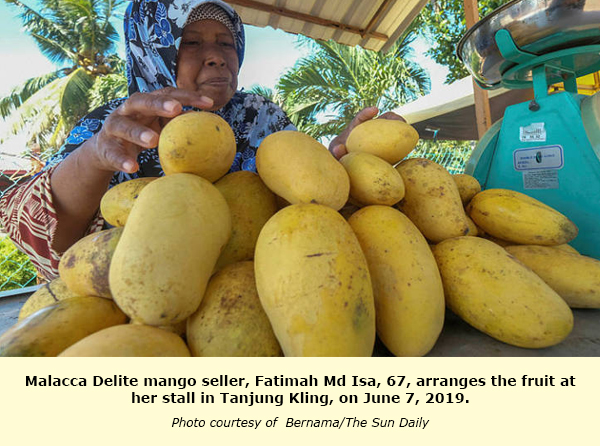If Perlis is famous for its Harumanis mangoes, Malacca can also be proud of its own mango variant, the Malacca Delite, which is a favourite among locals and tourists to this historical state.
One Malacca Delite seller, Fatimah Md Isa, 67, who has a stall located in Kampung Gelam, Tanjung Kling here, said the Chokanan MA224 mango variant cultivation project was first implemented in 2000.

She noted that what makes Malacca Delite different from other mango variants is its yellow-coloured flesh which is sweeter and juicy when it turns ripe.
“Besides being eaten raw, the Malacca Delite mangoes can be juiced and there are entrepreneurs who make pickles, halwa (fruit preserve in sugar syrup), rojak and yoghurt from the mango. Most children love Malacca Delite because it tastes sweeter.
“For those who want Malacca Delite, Kampung Gelam is the most famous place to go because many residents there and the surrounding areas grow them,“ she told Bernama.
Kampung Gelam and its surrounding areas were once abandoned paddy fields, but now has transformed into the state’s main Malacca Delite cultivation area, covering 139ha of orchards and more than 30,000 trees grown by some 100 villagers since 2000.
The Malacca Delite mango tree is able to bear fruit within three years, with an average of 70 mangoes per tree, and when it reaches about seven years old it is able to produce about 300 mangoes per tree.
Fatimah said with proper care, each mango can weigh up to 400g with prices increased significantly between RM6 (USD 1.45) and RM8 (USD 1.93) per kilogramme compared to RM10 (USD 2.41) for three kilogrammes in the early days of cultivation.
“When supply goes down, surely prices go up. That’s what is happening to Malacca Delite now. Many have stopped planting due to increase in costs and lack of support from the government and private sector.
“However, demand is still very good, we can sell an average of about 30kg on weekdays and 60kg during weekends,” she said.
A Malacca Delite orchard owner, Menhat Jaafar, 72, said the fruit has given villagers the chance to earn additional income, but echoed Fatimah’s concerns that a number of growers have stopped growing them due to various problems.
“I have a 1.21ha in Bukit Rambai which bear a lot of fruit and at the beginning, it gave good returns but as time passed, the price of farming natural material such as fertilisers have become more expensive. There is less government support and (fruit) theft is common too,” she said.
“When the monsoon season is too long, it also causes a problem because the trees are exposed to stem borer worms, caterpillars and fruit beetles, so we need help to solve these problems and produce high-quality fruit,” he said.
He said currently 70% of the Malacca Delite growers are involved with the crop commercially and as such, they need advisory support as well as assistance in terms of marketing and fertilisers.
Media personnel, Sharon Lai, 46, said in it’s early stages, Malacca Delite had huge potential and remembered that former Prime Minister Tun Abdullah Ahmad Badawi loved Malacca Delite mangoes when he visited Kampung Gelam in 2006.
“The state government at that time had plans to export the fruit and by-products to the Middle East.
“Why not revive these plans, maybe as an agro-tourism product where foreign tourists can come to the orchard to savour Malacca Delite or by improving the quality so that it can become a first-class export product,“ she said.
